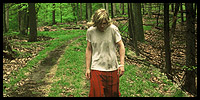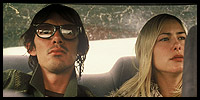
 |
|
Last Days (2005) Cast: Michael Pitt, Lukas Haas, Asia Argento, Scott Green, Nicole Vicius, Kim Gordon, Ricky Jay, Ryan Orion, Thadeus A. Thomas, Adam Friberg, Andy Friberg, Harmony Korine 2005 – 97 minutes Rated: Reviewed by Dustin Putman, August 6, 2005.  "Last Days" makes clear during the end credits that it is a fictional account of late rock musician Kurt Cobain's final days, nights and hours leading up to his own suicide, but one suspects watching filmmaker Gus Van Sant's minimalist triumph that the disclaimer is probably more for safety reasons. The final chapter in Van Sant's impressionistic ripped-from-the-headlines trilogy (after 2002's "Gerry," about two backpackers lost in the desert, and 2003's incendiary "Elephant," based on the Columbine High School shootings), "Last Days" is a mesmerizing triumph of both pitch-perfect minimalism and devastating existentialism, painting a bleak, uncompromising portrait of desolation personified.
"Last Days" makes clear during the end credits that it is a fictional account of late rock musician Kurt Cobain's final days, nights and hours leading up to his own suicide, but one suspects watching filmmaker Gus Van Sant's minimalist triumph that the disclaimer is probably more for safety reasons. The final chapter in Van Sant's impressionistic ripped-from-the-headlines trilogy (after 2002's "Gerry," about two backpackers lost in the desert, and 2003's incendiary "Elephant," based on the Columbine High School shootings), "Last Days" is a mesmerizing triumph of both pitch-perfect minimalism and devastating existentialism, painting a bleak, uncompromising portrait of desolation personified.
 The film, like the earlier entries in the loose trilogy, is light on plot and dialogue and conventional action, cinéma vérité at its most boldly authentic as it captures, more than any other motion picture in memory, the mundane little events that make up the majority of one's lifetime. Audience members who prefer (or only know) mass-appeal cinematic entertainment need not apply; they will be at a complete loss to the nuances and grand scheme of writer-director Van Sant's unhurried, ruminative stylistic approach. Single shots go on for minutes at a time where, from afar, nothing seems to really be happening, but that is the beauty in what has been achieved here; without the usual suspects like character development, flashy dialogue, story twists and easy answers to rely on, the viewer is forced to really ponder and consider Van Sant's intentions, as well as the underlying meaning behind each passing moment. The result is possibly the most deep and haunting film of the year so far.
The film, like the earlier entries in the loose trilogy, is light on plot and dialogue and conventional action, cinéma vérité at its most boldly authentic as it captures, more than any other motion picture in memory, the mundane little events that make up the majority of one's lifetime. Audience members who prefer (or only know) mass-appeal cinematic entertainment need not apply; they will be at a complete loss to the nuances and grand scheme of writer-director Van Sant's unhurried, ruminative stylistic approach. Single shots go on for minutes at a time where, from afar, nothing seems to really be happening, but that is the beauty in what has been achieved here; without the usual suspects like character development, flashy dialogue, story twists and easy answers to rely on, the viewer is forced to really ponder and consider Van Sant's intentions, as well as the underlying meaning behind each passing moment. The result is possibly the most deep and haunting film of the year so far.
 Blake (Michael Pitt), like Cobain, is a famed musician holed up in and around his secluded brick mansion in the day(s) preceding his ultimate suicide. Incessantly mumbling to himself, wandering around his estate's woodsy property when he isn't passing out in drug-induced stupors, he barely acknowledges or is acknowledged by four acquaintances staying with him (Lukas Haas, Scott Green, Asia Argento, Nicole Vicius). Drug usage is never glimpsed, and it doesn't need to be to understand that it is very much present in this lost man's life.
Blake (Michael Pitt), like Cobain, is a famed musician holed up in and around his secluded brick mansion in the day(s) preceding his ultimate suicide. Incessantly mumbling to himself, wandering around his estate's woodsy property when he isn't passing out in drug-induced stupors, he barely acknowledges or is acknowledged by four acquaintances staying with him (Lukas Haas, Scott Green, Asia Argento, Nicole Vicius). Drug usage is never glimpsed, and it doesn't need to be to understand that it is very much present in this lost man's life.
 Slowly, more details about Blake's past and present enter the frame. He is somewhat estranged from his young daughter, but claims in one of his few moments of coherence that he talks to her on the phone. He has recently left a rehab center prematurely, something not lost upon a detective (Ricky Jay) or a worried personal friend (Kim Gordon) who pleads for him to seek help. In one of the best moments, she asks the out-of-it Blake if his daughter knows her daddy is nothing but just another "rock and roll cliche." Indeed, before the film is over, Blake's life on earth will be, leaving those around him to wonder why he did what he did and what they could have possibly done to help him.
Slowly, more details about Blake's past and present enter the frame. He is somewhat estranged from his young daughter, but claims in one of his few moments of coherence that he talks to her on the phone. He has recently left a rehab center prematurely, something not lost upon a detective (Ricky Jay) or a worried personal friend (Kim Gordon) who pleads for him to seek help. In one of the best moments, she asks the out-of-it Blake if his daughter knows her daddy is nothing but just another "rock and roll cliche." Indeed, before the film is over, Blake's life on earth will be, leaving those around him to wonder why he did what he did and what they could have possibly done to help him.
 As Blake, Michael Pitt (2004's "The Dreamers") is nothing short of extraordinary. Besides sharing an eerie physical resemblance to Kurt Cobain, Pitt must carry the film for long stretches of time by himself onscreen, never saying more than some hard-to-distingish mumblings, acting so assuredly with his body language that he hardly seems like an actor at all. Despite an obviously fuzzy mind frame, Pitt manages to connect his character with the viewer in astonishingly truthful ways, as when he performs the original song, "From Death to Birth," for himself, filling his guitar strings and singing voice with a pain and sorrow that practically resurrects the spirit of Cobain's music.
As Blake, Michael Pitt (2004's "The Dreamers") is nothing short of extraordinary. Besides sharing an eerie physical resemblance to Kurt Cobain, Pitt must carry the film for long stretches of time by himself onscreen, never saying more than some hard-to-distingish mumblings, acting so assuredly with his body language that he hardly seems like an actor at all. Despite an obviously fuzzy mind frame, Pitt manages to connect his character with the viewer in astonishingly truthful ways, as when he performs the original song, "From Death to Birth," for himself, filling his guitar strings and singing voice with a pain and sorrow that practically resurrects the spirit of Cobain's music.
 Pitt's top-flight work is complimented by Gus Van Sant's staggering ability through his meticulous mise en scène and creepily distinguished use of sound and music to depict what it is like to feel the kind of loneliness and despair that seems impossible to overcome. A sequence in which Blake drifts in and out of consciousness as the television in front of him shows the inspirational Boyz II Men music video for "On Bended Knee" is unshakably powerful in its distinct paradox of presenting a kind of hope and love that Blake, nearing the end of his life, has no chance of finding, or even understanding.
Pitt's top-flight work is complimented by Gus Van Sant's staggering ability through his meticulous mise en scène and creepily distinguished use of sound and music to depict what it is like to feel the kind of loneliness and despair that seems impossible to overcome. A sequence in which Blake drifts in and out of consciousness as the television in front of him shows the inspirational Boyz II Men music video for "On Bended Knee" is unshakably powerful in its distinct paradox of presenting a kind of hope and love that Blake, nearing the end of his life, has no chance of finding, or even understanding.
 "Last Days" has only one downfall—a purposefully self-imploding ending that, nonetheless, still can't help but come off as a little anticlimactic—and even that is a minor quibble. Otherwise, director Gus Van Sant has made proud the finale of a three-part series of films that should stand as a watermark in what can still be done on film today when there is a clear vision, creative courage and resolute refusal to pander at work. Told out of chronological order, it is a motion picture of bleak beauty and mysterious transcendance, its layers one by one peeled off to uncover the darkness at constant odds with the light in the world. Wise, intelligent and impulsive in the best ways, "Last Days" captures with heartbreaking candidness how easy it is to be swallowed up whole in a tragic abyss of depression and drug abuse from which, for many unfortunate souls like Blake and Kurt, there is no roundtrip ticket. Meanwhile, the sun still rises in the morning, the wind still rustles through the trees, and life goes on.
"Last Days" has only one downfall—a purposefully self-imploding ending that, nonetheless, still can't help but come off as a little anticlimactic—and even that is a minor quibble. Otherwise, director Gus Van Sant has made proud the finale of a three-part series of films that should stand as a watermark in what can still be done on film today when there is a clear vision, creative courage and resolute refusal to pander at work. Told out of chronological order, it is a motion picture of bleak beauty and mysterious transcendance, its layers one by one peeled off to uncover the darkness at constant odds with the light in the world. Wise, intelligent and impulsive in the best ways, "Last Days" captures with heartbreaking candidness how easy it is to be swallowed up whole in a tragic abyss of depression and drug abuse from which, for many unfortunate souls like Blake and Kurt, there is no roundtrip ticket. Meanwhile, the sun still rises in the morning, the wind still rustles through the trees, and life goes on.
|
© 2008 by Dustin Putman |














